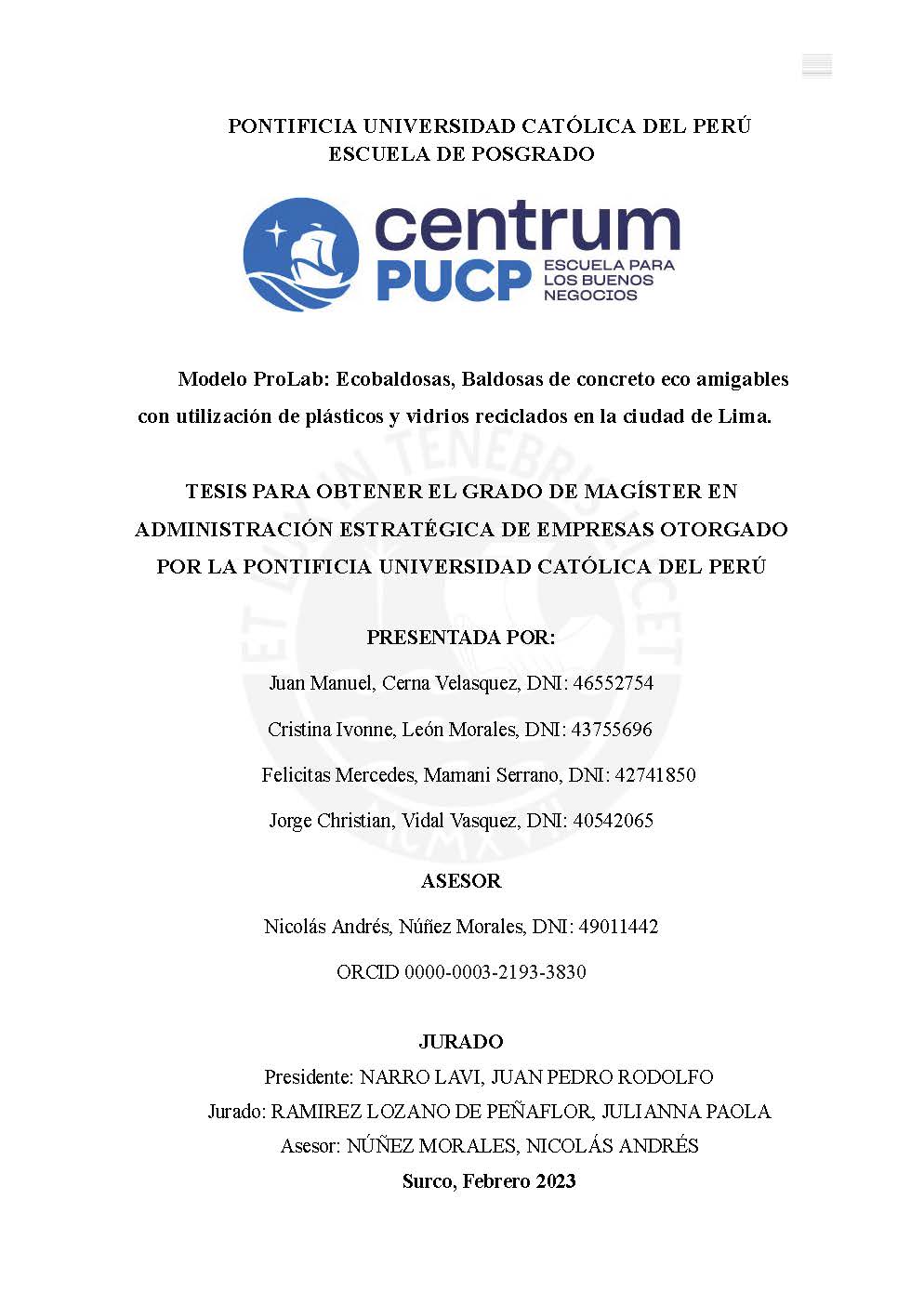| dc.contributor.advisor | Núñez Morales, Nicolás Andrés | |
| dc.contributor.author | Cerna Velasquez, Juan Manuel | |
| dc.contributor.author | León Morales, Cristina Ivonne | |
| dc.contributor.author | Mamani Serrano, Felicitas Mercedes | |
| dc.contributor.author | Vidal Vasquez, Jorge Christian | |
| dc.date.accessioned | 2023-05-04T17:17:12Z | |
| dc.date.available | 2023-05-04T17:17:12Z | |
| dc.date.created | 2023 | |
| dc.date.issued | 2023-05-04 | |
| dc.identifier.uri | http://hdl.handle.net/20.500.12404/24864 | |
| dc.description.abstract | El presente documento detalla el proceso mediante el cual se identificó un problema
social relevante y se diseñó una solución a través del uso de metodologías ágiles, dando
como resultado un modelo de negocio sostenible generando beneficios a todos los
stakeholders. La solución planteada recibe el nombre de Eco Baldosa, un revestimiento
de piso de alta gama accesible a niveles socioeconómicos C & D de Lima
Metropolitana, asimismo se busca reducir la contaminación ambiental al usar PET y
Vidrio molido en su fabricación creando un ecosistema de bienestar social integral.
La solución propuesta fue sometida a validación con potenciales usuarios.
Primeramente, con el factor de deseabilidad obteniendo como resultado de un 87% de
los entrevistados estarían dispuestos en comprar las Eco baldosas; a pesar de que este
tenga un costo mayor de 30% en comparativa con las mayólicas, pero compensado por
el tiempo de vida mucho mayor al revestimiento que usualmente usa este sector
económico. Adicionalmente, se validó el diseño de nuestro prototipo obteniendo un
80% de aprobación, considerando además la resistencia y durabilidad como factores
decisivos de compra. Finalmente, se validó la viabilidad financiera y sometidos los
resultados a través de un análisis de Montecarlo con 500 simulaciones del VAN
financiero, obteniendo como resultado un porcentaje muy bajo de pérdida de alrededor
del 2%.
Finalmente, se concluye que la solución de las Eco baldosas es un modelo de negocio
sostenible y escalable, que corresponde directamente con la ODS#12 con un índice de
relevancia social del 50%, generando un VAN financiero de S/ 1,920,455 y un TIR del
77% con una inversión total de S/ 1 190 046 y VAN Social de S/ 4 890 443. | es_ES |
| dc.description.abstract | This document details the process by which a relevant social problem was identified and a
solution was designed through the use of agile methodologies, resulting in a sustainable
business model generating benefits for all stakeholders. The proposed solution is called Eco
Tile, a high-end floor covering accessible to C & D socioeconomic levels of Metropolitan
Lima, it also seeks to reduce environmental pollution by using PET and ground glass in its
manufacture, creating an ecosystem of social welfare. Integral.
The proposed solution was subjected to validation with potential users. Firstly, with the
desirability factor obtained as a result of 87% of the interviewees they would be willing to
buy the Eco tiles; despite the fact that this has a higher cost of 30% compared to majolica, but
compensated by the much longer life of the coating that this economic sector usually uses.
Additionally, the design of our prototype was validated, obtaining 80% approval, also
considering resistance and durability as decisive purchase factors. Finally, the financial
viability was validated and the results submitted through a Monte Carlo analysis with 500
simulations of the financial NPV, obtaining as a result a very low percentage of loss of
around 2%.
Finally, it is concluded that the Eco tile solution is a sustainable and scalable business model,
which corresponds directly to ODS#12 with a social relevance index of 50%, generating a
financial NPV of S/1,920,455 and a IRR of 77% with a total investment of S/ 1 190 046 and
Social VAN of S/ 4 890 443. | es_ES |
| dc.language.iso | spa | es_ES |
| dc.publisher | Pontificia Universidad Católica del Perú | es_ES |
| dc.rights | info:eu-repo/semantics/openAccess | es_ES |
| dc.rights.uri | http://creativecommons.org/licenses/by-nc-nd/2.5/pe/ | * |
| dc.subject | Negocios--Planificación | es_ES |
| dc.subject | Desarrollo sostenible--Perú | es_ES |
| dc.subject | Innovaciones tecnológicas--Administración | es_ES |
| dc.subject | Concreto--Evaluación--Perú | es_ES |
| dc.subject | Sector construcción--Perú | es_ES |
| dc.title | Modelo prolab: Ecobaldosas, baldosas de concreto eco amigables con utilización de plásticos y vidrios reciclados en la ciudad de Lima | es_ES |
| dc.type | info:eu-repo/semantics/masterThesis | es_ES |
| thesis.degree.name | Maestro en Administración Estratégica de Empresas | es_ES |
| thesis.degree.level | Maestría | es_ES |
| thesis.degree.grantor | Pontificia Universidad Católica del Perú. CENTRUM | es_ES |
| thesis.degree.discipline | Administración Estratégica de Empresas | es_ES |
| renati.advisor.dni | 49011442 | |
| renati.advisor.orcid | https://orcid.org/0000-0003-2193-3830 | es_ES |
| renati.author.dni | 46552754 | |
| renati.author.dni | 43755696 | |
| renati.author.dni | 42741850 | |
| renati.author.dni | 40542065 | |
| renati.discipline | 413307 | es_ES |
| renati.juror | Juan Pedro Rodolfo Narro Lavi | es_ES |
| renati.juror | Julianna Paola Ramirez Lozano | es_ES |
| renati.juror | Nicolás Andrés Núñez Morales | es_ES |
| renati.level | https://purl.org/pe-repo/renati/level#maestro | es_ES |
| renati.type | https://purl.org/pe-repo/renati/type#tesis | es_ES |
| dc.publisher.country | PE | es_ES |
| dc.subject.ocde | https://purl.org/pe-repo/ocde/ford#5.02.04 | es_ES |







